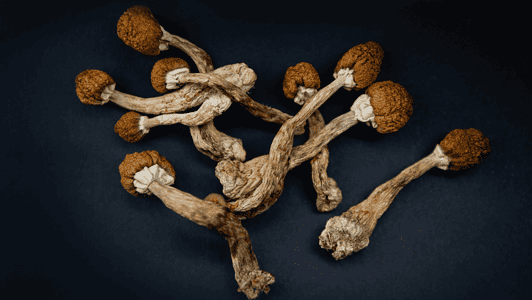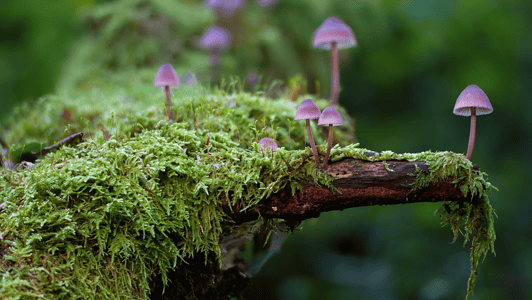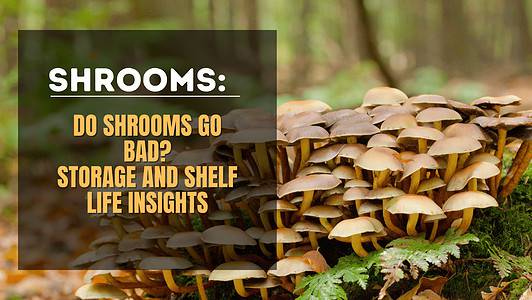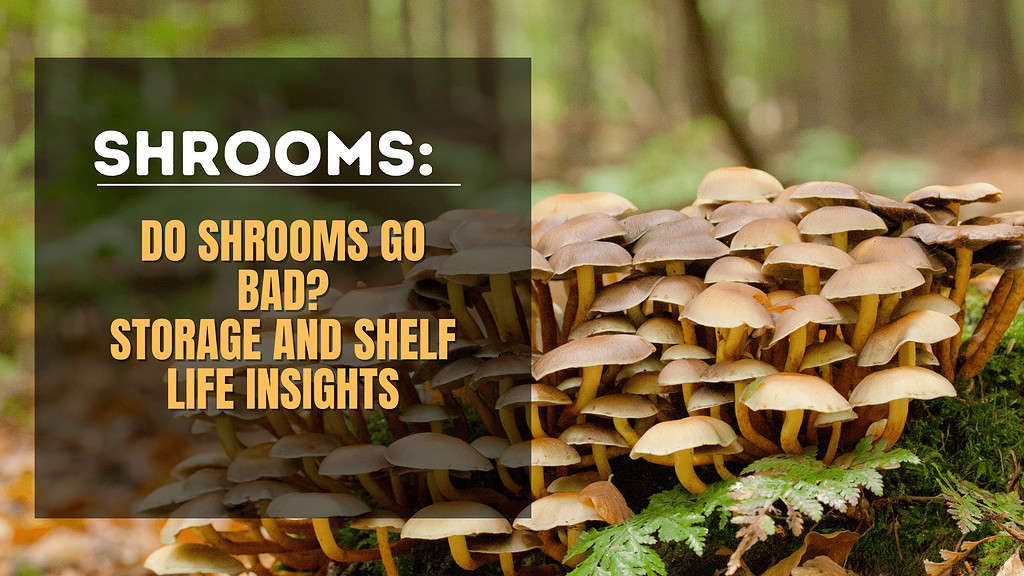Do Shrooms Go Bad? Storage and Shelf Life Insights
Welcome to our exploration of the world of shrooms. Imagine you’ve just come into possession of some fresh, potent shrooms. You’re looking forward to the experience, but you also wonder, “Do shrooms go bad?” It’s a crucial question, and the answer lies in understanding these fascinating fungi’s storage and shelf life. Here at our health shop, we prioritize your safety and satisfaction. We’ve put together this guide to offer insights into how to store shrooms effectively and maintain their quality.
Shrooms, like any organic material, can deteriorate over time. However, the rate they do so can vary widely depending on several factors. Understanding these factors is essential. It can mean the difference between a safe, enjoyable experience and a disappointing or harmful one. We’ll delve into the ideal conditions for storage, the signs of spoilage to look out for, and the best practices to extend the shelf life of your shrooms.
As a trusted provider, we’re here to ensure you have all the information you need to make informed decisions about using and storing shrooms. So, whether you’re a seasoned user or new to the world of psychedelics, keep reading to learn more about maximizing the quality and safety of your shrooms. Your well-being is our top priority.
Understanding Shrooms
Shrooms, more formally known as psychedelic mushrooms, contain psychoactive compounds like psilocybin. They come in various types, each with its unique properties and effects. Understanding shrooms’ natural composition and properties is crucial as it directly influences their use, benefits, and potential risks. While they offer various benefits, knowing the risks associated with spoiled or rotten shrooms is essential. We also touch upon the legal status and considerations surrounding their use.
Related: 5 Best CBD Pills and Capsules from Our Health Shop
Signs of Spoilage in Shrooms
Identifying bad shrooms is vital for your safety. The visual indicators include noticeable changes in color and texture. A spoiled shroom often has a distinct odor that differs from the earthy scent of a fresh one. Any taste alterations should also raise a red flag. Understanding the health risks of consuming spoiled shrooms is crucial, as ingesting them can lead to adverse effects.
Ensure your shrooms stay fresh and potent. Learn the best storage practices from our guide and shop now for top-quality shroom products at Burman’s Health Shop!

Factors Affecting Shroom Shelf Life
Several factors influence how long your shrooms will last. The impact of temperature and humidity is significant, with cooler, dry environments generally prolonging shelf life. Air exposure can lead to degradation, while light can affect potency and freshness. The initial quality and harvesting conditions of the shrooms also play a part, as does the method of storage used. We’ll delve into how these factors contribute to the longevity of your shrooms.
Fresh Shroom Storage Tips
Storing fresh shrooms properly is vital to maintain their quality and potency. Ideal conditions include a cool, dark, and dry place. We recommend using breathable containers like paper bags or cardboard boxes to allow air circulation. Under optimal conditions, fresh shrooms can last for 5 to 10 days. Avoid common mistakes like storing them in plastic bags, which can trap moisture and accelerate spoilage. Recognize the signs that fresh shrooms are no longer suitable, such as sliminess, discoloration, or an off-odor, to ensure you consume them at their best.
Related: Support Your Gut Health with Probiotics
Drying Shrooms for Extended Shelf Life
Drying shrooms significantly extend their shelf life and preserve their potency. The benefits include ease of storage and prolonged usability. The drying process involves cleaning the shrooms, slicing them if they’re large, and spreading them out in a dry, warm area or using a food dehydrator. You’ll know they’re properly dried when brittle and break when bent. Store dried shrooms in an airtight container in a cool, dark place. The expected shelf life of properly dried shrooms can be several months to a year.
Freezing Shrooms: Pros and Cons
Freezing is another method to consider for shroom storage. The advantages include retaining quality over a long period and the convenience of having them on hand. However, there are potential drawbacks, such as the risk of freezer burn or loss of potency over time. Use proper freezing techniques like vacuum sealing to protect them from air exposure. Understand the thawing process and its impact on quality — slow thawing in the refrigerator is usually best. Compare this method with others to decide which suits your needs best.
Innovative Storage Solutions
Innovative storage solutions are available for the best ways to preserve their shrooms. Vacuum sealing can significantly extend shelf life by removing air that could degrade the shrooms. Desiccants like silica gel packs help control moisture in storage containers. Explore temperature-controlled storage options like cool cellars or fridges. Keep abreast of the latest advancements in shroom storage technology for the best results. Consider DIY solutions and commercial products to fit your needs best.
Related: Best THC-O Flower 2022: Know Everything About THC-O Flower
Safety First: Handling and Consumption Tips
When it comes to shrooms, handling them with care is paramount. They are potent and can have profound effects, so taking them correctly is crucial. Always recognize the signs of contamination or spoilage, such as mold, off-odors, or discoloration. Engaging in safe consumption practices involves understanding dosage, setting, and your physical and mental state. Know when to discard questionable shrooms; if in doubt, throwing them out is safer. We also recommend seeking safe handling and preparation resources to ensure a positive and safe experience.

Maximize the shelf life of your shrooms with our expert insights. Dive into our storage guide and shop now for all your Burman’s Health Shop shroom needs!
Maximizing Shroom Quality and Safety
Let us recap the key insights we’ve discussed. Proper storage is crucial in maintaining the quality and safety of shrooms. Factors such as temperature, humidity, and light significantly determine how long your shrooms will last. By understanding these elements, you can ensure that your shrooms remain potent and safe for consumption.
We must emphasize the importance of proper storage for safety. Shrooms are powerful substances, and their misuse or consumption, when spoiled, can lead to adverse effects. It’s essential to recognize the signs of spoilage and understand the best ways to store your shrooms to prevent any risks to your health.
We encourage you to follow the best practices for storing shrooms. Whether you keep them fresh, dry, or freeze them, knowing the correct methods will help you maximize their shelf life and effectiveness. Your role in this process is crucial. Acknowledging the individual’s responsibility in ensuring the quality of their shrooms is vital for a safe and enjoyable experience.
For those seeking more information or exploring high-quality natural products, we invite you to visit Burman’s Health Shop. You’ll find many resources and products to support your journey with shrooms and other natural substances here. Let us help you maximize shroom quality and safety, ensuring a beneficial and responsible experience with these remarkable natural wonders.
Disclaimer: The information and content in this article are intended for informational purposes only. It should not be a substitute for professional or medical advice. You should always speak with a licensed professional before you follow anything you read online.
Disclaimer:
The statements made regarding these products have not been evaluated by the Food and Drug Administration. The efficacy of these products has not been confirmed by FDA-approved research. These products are not intended to diagnose, treat, cure or prevent any disease. All information presented here is not meant as a substitute for or alternative to information from health care practitioners. Please consult your health care professional about potential interactions or other possible complications before using any product. The Federal Food, Drug and Cosmetic Act requires this notice.




